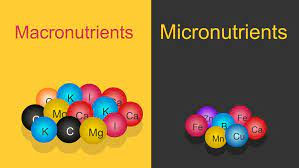
Introduction
You've heard the term "macros" before, but you might not know what it means. Well, I'm here to tell you that macros are very important and knowing your macro count is crucial. In this article, we're going to cover everything from macronutrient breakdowns to how many grams of protein you should be eating each day. By the end of this article, you'll have a firm understanding of exactly what macros are—and how they can benefit your body!
What are macronutrients?
Macronutrients are the main components of food. They include carbohydrates, fats and proteins. Macronutrients provide calories to the body and help with growth and maintenance of cells.
What are micros?
You've probably heard of the word "micro-nutrients," but what exactly are they?
Micro-nutrients include vitamins, minerals and phytochemicals. These are the essential nutrients your body needs in small amounts to function properly.
Vitamins and minerals can be found in food sources such as fruits, vegetables and whole grains. Phytochemicals are chemicals that occur naturally in plants (phyto means "plant" in Greek). They often have antioxidant properties or help protect against disease by neutralizing free radicals before they can damage cells within your body.
How do I calculate my macros and micros?
To calculate your daily caloric requirements, multiply your current weight by 10 to 15. This is the minimum amount of calories you need to eat every day to maintain your current body weight. If you want to lose weight, aim for 12-15x current weight; if you want to gain muscle or increase performance during exercise sessions, go with 16-20x current weight.
Your next step will be calculating how much protein (in grams), fat (in grams) and carbs (in grams) are required on a daily basis based on how many calories per day were calculated above. There's no one-size-fits all approach here--it depends on whether or not you're trying to lose weight as well as what kind of activities will be undertaken during each day's training session(s). The general rule is 1 gram of protein per kilogram (.45 pounds) bodyweight per day; 0.5-1 g/kg/.22-.44 lbs fat; 2 g/kg/.88 lbs carbs
The role of fats in your diet.
Fats are essential for hormone production, brain function and cell membrane integrity. They also help you absorb certain vitamins like A, D, E and K. The body can't store enough fat to last more than a few days without eating fat (in fact, when you fast for longer than 24 hours your body starts to break down muscle tissue in order to get energy).
The role of protein in your diet.
Protein is an essential nutrient, meaning it's necessary for good health and can't be replaced by other nutrients. Protein helps build muscle mass and maintain it over time. It also helps to repair damaged muscles after exercise, as well as making enzymes, hormones and other body chemicals.
Protein is used by cells to produce energy via a process called ATP synthesis (adenosine triphosphate). This process releases energy from food we eat so that our bodies can use it for growth or movement (like walking).
Knowing your macros and micros can help you find your ideal weight and keep you healthy.
Knowing your macros and micros can help you find your ideal weight.
Knowing your macros and micros can help you build muscle.
Knowing your macros and micros can keep you energized for workouts.
Knowing your macros and micros can help prevent mood swings that lead to overeating or skipping workouts altogether--which is something that many people do when they're feeling down in the dumps, stressed out about work or finances, etc!
Conclusion
Knowing your macros and micros can help you find your ideal weight and keep you healthy. It's important to remember that there is no perfect formula for calculating these values--the best way is to experiment with different combinations until you find one that works for you.

Comentários